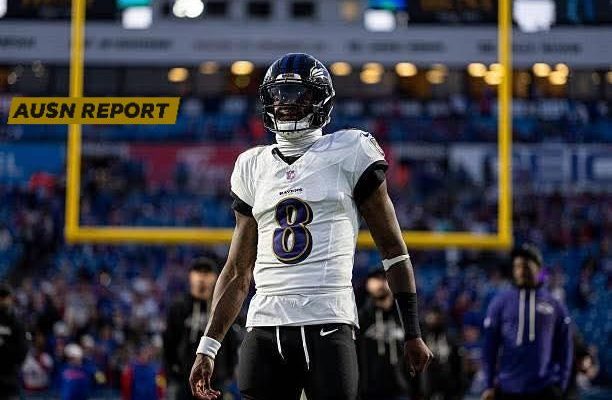The NFL confirmed this week that it will not fine Baltimore Ravens quarterback Lamar Jackson for his interaction with a Buffalo Bills fan during Sunday night’s primetime matchup, a decision that closes the door on league discipline while shining a light on a growing conversation around player safety, fan behavior, and the challenges of navigating the emotions that come with professional sports. “The matter has been addressed by the club and there is no further action from the league,” NFL official Brian McCarthy said in a statement, making clear that responsibility for resolving the issue rests with the Ravens organization.
The incident, which drew attention across social media and sports talk shows, took place as Jackson and the Ravens exited the field after a hard-fought game. A fan in Bills attire directed comments toward the former MVP, sparking a heated response from Jackson before security intervened and moved the players toward the locker room tunnel. While the NFL reviewed the situation, the league ultimately decided against issuing a fine, perhaps recognizing both the provocation involved and the quick response from Baltimore to handle matters in-house.
The Ravens, in their own statement, emphasized that they view player safety as paramount, both in terms of physical security and mental well-being. “Our player’s safety is of the utmost importance,” a Ravens official said. “We have spoken to Lamar, who understands the impact of the situation, about the incident. While we will keep internal matters private, we have implemented additional security protocols—both at home and on the road—to better protect our players and handle negative fan interactions moving forward.” That response underscores the delicate balance organizations face in supporting their star players while also recognizing the scrutiny that comes with public altercations.
For Jackson, this is far from the first time he has been at the center of headlines, though rarely for disciplinary matters. The former Heisman Trophy winner and two-time league MVP is one of the NFL’s most marketable and recognizable faces, and his dynamic style of play has made him a favorite not only in Baltimore but across the league. Yet being one of the league’s brightest stars also means being a lightning rod for criticism, especially in hostile environments on the road. Opposing fans see him as the ultimate target, both because of his stature and his fiery competitiveness. On Sunday night, those dynamics came to the forefront in a moment that could have spiraled further but was quickly defused.
What makes this decision by the NFL noteworthy is the precedent it sets for how similar situations might be handled in the future. The league has a long history of handing out fines for unsportsmanlike conduct or public disputes, often regardless of provocation, as part of a broader effort to maintain its image of professionalism. By opting not to fine Jackson, the NFL is essentially acknowledging that fan behavior plays a role in these interactions and that players deserve a degree of understanding when responding to heckling or inappropriate comments. This is a subtle but important shift in tone from a league that has traditionally taken a hardline stance on player discipline.
The Ravens’ internal handling of the matter also reflects the organization’s desire to protect its franchise cornerstone without escalating the situation. Lamar Jackson is the heartbeat of the Baltimore offense, the centerpiece of their Super Bowl aspirations, and a beloved figure in the community. Any punishment, whether financial or symbolic, could risk straining the relationship between the star quarterback and the team. Instead, Baltimore chose to focus on increased security and behind-the-scenes conversations, signaling their intent to learn from the incident while keeping it in-house. This approach demonstrates trust in Jackson’s maturity and their belief that he understands the weight of his actions without the need for public reprimand.
The larger issue, however, goes beyond one isolated exchange. Fan behavior at stadiums has become an increasingly important topic across sports. With the rise of social media, more incidents of unruly conduct are being recorded, shared, and dissected in real time, raising awareness of how often players face verbal abuse in hostile arenas. For decades, athletes have been expected to tune out heckling, but the line between good-natured taunts and personal, offensive remarks has blurred. Fans feel emboldened by the environment, sometimes crossing boundaries under the assumption that players will not respond. When those boundaries are crossed, the risk of confrontation increases, and organizations are left to determine how to best protect both their athletes and the integrity of the game.
The Ravens’ decision to implement additional security measures illustrates a growing recognition that players cannot be expected to absorb all of that hostility without support. Teams across the league have taken similar steps in recent years, from creating buffer zones between fans and player tunnels to increasing the presence of security guards in high-traffic areas. Still, incidents continue to occur, often in nationally televised games where emotions run high. The NFL, while declining to fine Jackson, will likely continue to evaluate how it can better equip teams to manage these moments, ensuring that the focus remains on the field rather than what happens around it.
For Jackson, this incident is likely to be little more than a footnote in his career, but it is a reminder of the spotlight he lives under every week. At just 28 years old, he has already achieved accolades that most quarterbacks can only dream of, including multiple MVPs, Pro Bowl selections, and deep playoff runs. His style of play—equal parts electric speed, elusive footwork, and strong arm—has redefined the position, making him both a hero to Baltimore fans and a nightmare for defensive coordinators. That kind of brilliance comes with an equally intense level of scrutiny, and Sunday night served as a reminder that even the best players are human, susceptible to frustration when emotions boil over.
The fan in question has not been publicly identified, and it is unclear whether the Bills organization will pursue any action against the individual. Teams are often reluctant to ban fans unless their conduct crosses into clearly unacceptable territory, such as physical aggression or discriminatory remarks. Yet the optics of the incident have reignited conversations among fans and media about accountability. Should players be expected to absorb harsh words without reacting? Or should the league and its teams do more to monitor and address fan conduct before it escalates to the point of player involvement? These are difficult questions with no easy answers, but the conversation itself reflects the complexity of the modern sports environment.
Another layer to this situation is how it will resonate in locker rooms across the league. Players often pay close attention to disciplinary decisions, and the NFL’s choice not to fine Jackson will be noticed. Many athletes have expressed frustration in the past about feeling held to higher standards than the fans who taunt them, leading to a sense of imbalance in accountability. By declining to punish Jackson, the league is sending a message that it recognizes the role of provocation and that players should not always bear the full brunt of responsibility. That message could foster goodwill among players, who often feel that their perspectives are overlooked in disciplinary matters.
The decision also carries significance for the Ravens’ season trajectory. Baltimore entered 2025 with sky-high expectations, boasting one of the league’s most balanced rosters and a quarterback who remains in his prime. Distractions, even minor ones, can become magnified in a competitive AFC where every win matters. By resolving the issue quickly and quietly, the Ravens ensured that their focus remains on football, not controversy. Jackson himself is known for his competitive spirit and team-first mindset, and it is likely that he will use the incident as fuel rather than a setback.
Looking beyond this particular week, the NFL’s response highlights the importance of context in disciplinary matters. Not all interactions are equal, and not all incidents deserve the same punishment. In Jackson’s case, the league acknowledged that the situation was addressed sufficiently by the Ravens, an approach that avoided inflaming tensions while still signaling that the matter was taken seriously. This kind of nuanced decision-making could pave the way for a more balanced approach to discipline in the future, where circumstances are weighed more carefully rather than applying blanket policies.
Ultimately, this story is as much about the culture surrounding football as it is about Lamar Jackson himself. The NFL remains the most watched and scrutinized sports league in the world, with millions tuning in every week to witness the drama on the field. With that visibility comes an immense level of passion from fans, the vast majority of whom respect the boundaries of good sportsmanship. But for the few who cross the line, incidents like Sunday night serve as a reminder that teams and leagues must be proactive in protecting their players. Jackson’s exchange with a fan may fade from headlines quickly, but the questions it raises about accountability, security, and the human side of competition will linger far longer.
As Baltimore moves forward, the message is clear: the focus is on football, and the organization stands firmly behind its quarterback. Jackson remains the face of the Ravens, a player whose brilliance has defined a franchise and inspired countless fans. The league, in choosing not to fine him, has recognized that context matters and that even stars deserve grace in the face of provocation. What could have been a prolonged controversy has instead become a moment of reflection about the responsibilities of players, fans, teams, and leagues alike. In the end, the story of Lamar Jackson and a Bills fan on a Sunday night will not be remembered for the confrontation itself but for the broader questions it raised about the evolving relationship between athletes and the people who watch them.



